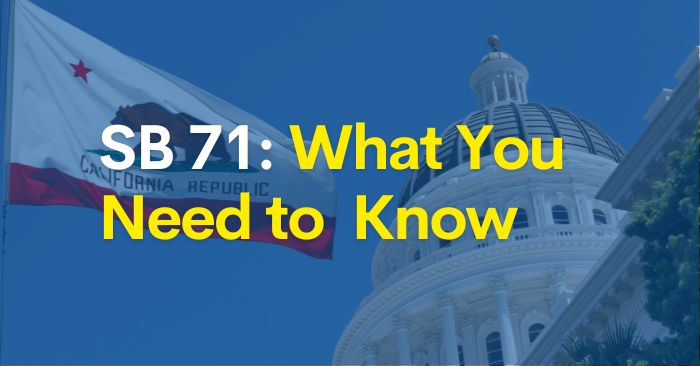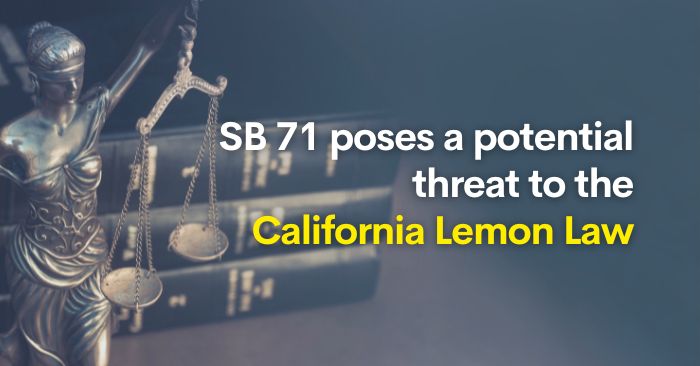
California consumers have long relied on the state’s strong lemon law legislation to protect their rights when purchasing vehicles–recent developments in legislation, however, have stirred concerns among consumer advocates.
Consumer groups in California are speaking out against a bill, SB 71, introduced by California Senator Tom Umberg. SB 71 recently passed the Assembly with an overwhelming vote of 78-0, and it’s now awaiting Governor Gavin Newsom’s decision. This bill has raised eyebrows as it will weaken enforcement of California’s Lemon Law.
In this blog post, we will delve into the implications of SB 71, what it means for California consumers, and the steps California consumers can take to protect their rights and voice their opposition to this bill.
Understanding SB 71
SB 71 is a piece of legislation that has garnered significant attention and debate in California. The bill’s primary objective, as advocated by its proponents, is to streamline the process of resolving disputes between consumers and auto manufacturers, with a particular focus on small claims and limited civil courts.
However, the bill will tip the scales in favor of corporations, leaving consumers at a significant disadvantage.
This bill proposes an increase in the jurisdictional threshold for cases involving defendants within the small claims court from $10,000 to $12,500. It also seeks to elevate the existing limit for small claims court jurisdiction in specific actions. Presently, the jurisdictional threshold for most limited civil cases stands at $25,000, but this bill aims to raise it to $35,000.
One of the key concerns raised by opponents of SB 71 is the potential for consumers to face corporations without legal representation in small claims courts. Assembly member Papan, a proponent of the bill, has emphasized this aspect as a positive change. However, the reality is that this could put consumers at a significant disadvantage when dealing with well-funded and experienced legal teams representing large corporations.
Consumer advocate groups are urging Governor Newsom to veto SB 71 as a result of the harm it will cause millions of moderate and low-income Californians victimized by corporations that violate California’s consumer protection laws, including the California Lemon Law.
Most California consumers have little to no discretionary income, they are economically vulnerable, and need the full protection of consumer protection laws.
The new bill will favor corporate interests at the expense of vulnerable consumers in many ways including but not limited to severe limitations on discovery and depositions, drastically reducing the time period for filing appeals, lack of access to appellate courts for appeals, lack of authority for injunctive relief, lack of access in many cases to civil penalties, and arbitrary caps on damages that a jury or judge can award.

Implications for California Consumers
Here are some potential implications of SB 71:
- Reduced Access to Legal Representation: SB 71 raises concerns about the accessibility of legal representation for consumers. If the bill becomes law, consumers could find themselves taking on complex legal proceedings without the assistance of an attorney. This could be particularly challenging when facing off against large corporations armed with extensive resources and experienced counsel. Without legal counsel to guide them through the intricate web of legal procedures and tactics, consumers will be significantly disadvantaged in their pursuit of justice.
- Increased Burden on Consumers: The potential consequence of limited access to legal expertise is an increased burden on consumers. In cases involving auto fraud or lemon law violations, consumers already face the daunting task of proving their claims. SB 71 may exacerbate this challenge, as consumers without legal representation will have difficulty presenting a compelling case. This, in turn, will lead to unfavorable outcomes and a injustice for consumers who have been wronged by auto manufacturers.
- Erosion of Consumer Rights: The passage of SB 71 could signify a shift from California’s longstanding commitment to automotive consumer rights. Historically, California has been at the forefront of protecting consumers from unscrupulous practices, and its auto lemon law has been a cornerstone of this effort. SB 71 could potentially change this trajectory. If Governor Newsom signs SB 71 into law, it would mark the first time a California governor has enacted legislation that weakens the state’s auto lemon law.
- Denial of Access to Unlimited Civil Courts: SB 71 threatens to harm millions of California consumers who currently benefit from access to unlimited civil courts. Millions of moderate to low-income California consumers harmed by corporations that violate the California Lemon Law would lose access to unlimited civil courts. These consumers will be less likely to be able to obtain legal counsel thus placing them in a significant disadvantage when they are victims of unethical corporations armed with high-powered attorneys who specialize in ways to evade being held accountable for violating consumer protections laws.
Steps Consumers Can Take
While the passage of SB 71 has raised concerns, California consumers can still take proactive steps to protect their rights in the face of this changing legal landscape:
- Contact Governor Newsom: Consumers who are concerned about the potential implications of SB 71 can contact the California Governor’s office to express their views. Through a personalized message, contact the governor and request a veto of the bill. (Note: While SB 71 might not be available as an “active bill” option just yet, this status is expected to change soon.)
- Stay Informed: Consumer advocacy groups, law firms, and concerned individuals should keep their communities informed about SB 71 and its potential consequences. Sharing information about the bill on your website and social media platforms can help raise awareness.
- Engage Your Network: Encourage colleagues and fellow consumer advocates to join the effort to protect consumer rights. The more people are aware of the potential consequences of SB 71, the stronger the collective voice in advocating for consumer protection.
SB 71’s passage represents a significant development in California’s legal landscape, one that has prompted concerns among consumer advocates. The bill raises important questions about the balance of power between consumers and corporations and tips the scales in favor of large, well-funded corporations.
As Governor Newsom considers whether to sign or veto SB 71, the collective efforts of consumers, legal professionals, and advocacy groups will play a crucial role in shaping the future of consumer protection in California.
By staying informed and actively engaging in the process, Californians can continue to assert their rights and advocate for a fair and just automotive industry where their rights are protected.




